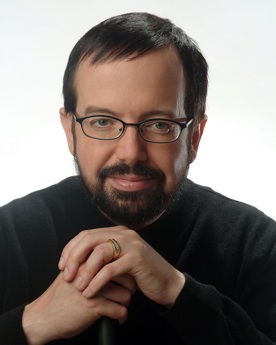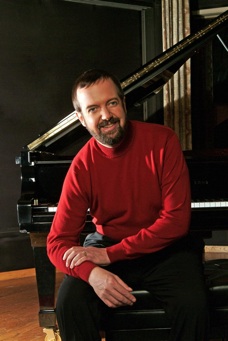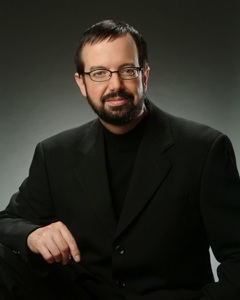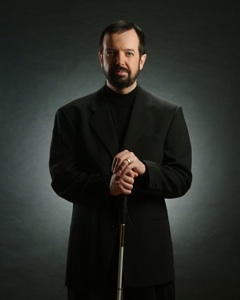This is the third interview I’ve done with Kevin Kern over the past ten years, and I have to laugh whenever I think about the first phone interview we did in 1999. I had about fifteen questions prepared, and Kevin answered them all with “yes” or “no,” - we were done in about five minutes! Panic started to set in, but then we relaxed and had a wonderful conversation that became that interview. A few months later, Kevin made the first of several appearances at my house for concerts and workshops with my students. I helped edit a songbook of Kevin’s music that was done in Korea, and had the incredible honor of giving Kevin his first experience of hearing his music played by other people - kids, no less! Two of the highlights of my musical life were watching Kevin improvise duets with Spencer Brewer and David Lanz. Pure magic! In addition to the smooth, gentle music Kevin Kern is known for, he is an amazing jazz and classical pianist - something he hopes to share more often!
Kevin Kern’s newest album, “Endless Blue Sky,” was recently released on Real Music. In this interview, we talk about this new music, some of the challenges blind musicians face, and even Japanese baseball! Enjoy...
KP: Ten years ago, you didn’t think your music was suitable for a live setting and now you’re playing concerts all over Asia. Do you plan to tour to promote “Endless Blue Sky”?
Kern: We’re hoping to return to the Far East, perhaps in the fall, and we’re also looking into some US dates.
KP: I thought your move from San Francisco to Minnesota might add an element of “chill” to your music, but “Endless Blue Sky” is very warm. Has the move affected your music at all?
Kern: By “chill,” do you mean minus 20 degrees?
KP: Uh huh.
Kern: Cute! (laughing) We’re surviving. I would say this: If you move from a space that looks out on an urban landscape with streets and traffic to a space that’s twice the size with a large backyard that backs up to a wetland preserve that no one can build on, that can’t help but alter your mood in a positive way.
The house in which I grew up was on two acres of land that backed up to a golf course. We lived on a dirt road that was only used by the people who lived there and all of us kids were the same age. We rode our bicycles and didn’t have many cars to contend with. The street that I live on now is a dead end street off of a dead end street, so I have a large area where I can ride without many cars. I’m back to the world I knew and loved as a boy! That’s not even counting when Pam and I take our bikes to any number of amazing bike paths which are totally car-proof and run for miles. They’re all flat, so you can ride your bike for twenty miles. Am I jazzed about that? You bet!
It’s important for your readers to understand that there isn’t a specific cause and effect relationship between the natural world and my music. “After the Rain” from “In The Enchanted Garden” and “A Million Stars” from “The Winding Path” are really the only examples of where my perception of natural events elicited specific compositions. The association between my music and the natural world is much more subtle.
As I said in the liner notes of the record, my music comes from three principle sources: my strong classical education, a love of cinematic music and the people who write it, and a strong influence by the great popular songwriters who have gone before me. My music is not an attempt to depict specific natural events or scenes, but, as I said above, if you live in an environment that’s much more pleasant than the one you left, it’s going to have an impact on your state of mind.
The other important thing is that I’m also inspired by pretending that I’m an instrument other than a piano. That comes from years of not being able to write down my own instrument parts. Thinking in terms of the musical voices of other instruments forces you out of the same tired piano based devices. The result, when it works, is new music with new possibilities. This is further enhanced by more and better sampled instruments with which to demo my ideas during the creative process and by the ability to actually notate the parts for the live musicians who eventually bring them to life for the listener on the CD itself.
KP: Is there anything in particular that you miss about California?
Kern: Not really. San Francisco has a mono-dynamic climate - it was always 65 degrees and cool. You could wear shorts maybe ten times a year, but I live in shorts from Memorial Day until Labor Day here. I pay for it dearly with this 20 below nonsense, but I love the four seasons and real summer. I love firing up the barbecue and grilling all that carnivorous stuff I love so much.
KP: You’ve expressed that recent technological advances have made it possible for you to write music for other instruments. Let’s talk about that.
Kern: Starting with “Summer Daydreams,” I was able to write out the parts with some editing help, but since then, I have been able to do them myself. On our first trip to Korea, we had an orchestral book that I did by creating MIDI files that were then assembled and converted into notation by a friend who was also the conductor on the tour. For my second Korea tour and the “Enchanted Garden” and "Imagination's Light” songbooks, I was able to do my own parts from scratch. Sibelius (music notation software named after the Finnish classical composer) is very usable for a blind person right out of the box because most of its commands are keyboard-driven rather than mouse-driven. I showed it to David Pinto, the developer of Cake Talking for Sonar, the blind friendly solution I use with Sonar 8 to create all my keyboard parts on the albums, and said, “See what you can do with this.” Within 45 minutes, he had it goin’ on. Then he developed a product called Sibelius Speaking, and that’s what I used to write the “Imagination’s Light” and “Enchanted Garden” books and to expand the small ensemble touring book we use for concerts. The stage ensemble calls for one violin, one cello, and one synth player playing the string parts. At its most expansive, you will also find a guitarist, a woodwind player, a bassist, and a drummer, all with parts that I’ve written. You can only imagine the electric thrill I feel every time those parts come back to my ears. It's been a life changing experience for me.
KP: When you say Sibelius is keyboard driven, are you doing commands? Do you use A through G for the notes themselves?
Kern: Yes, and you have the option of choosing your notes with either a MIDI keyboard or the PC keyboard. If you choose the PC keyboard, you have to stipulate octave.
KP: How do you do that?
Kern: If it’s the wrong octave, the CTRL-up and CTRL-down arrows will move the note to the octave you want. If you use the MIDI keyboard, your octaves are already correct. You use the numeric keys on the right-hand side of the keyboard to decide what note value you want. If you have several eighth notes, you push a button on the keypad, and the next notes are all eighth notes until you change it. You eventually become facile in making those transitions.
KP: Can you hear an immediate playback?
Kern: Yes, you can hear your notes back immediately whether you're entering your notes one at a time or in real time. If you play in real time to a metronome, you can adjust the parameters of what the computer will accept so that it rounds off to the nearest eighth or sixteenth or whatever you choose. If you don’t do that, the program will define a note value by exactly when you release the note, yielding a triple-dotted mess!
KP: I’ve proofed some of those!
Kern: If you make allowances for that, you can be very efficient. It’s best to enter one hand at a time because trying to program Sibelius to split the staves of a piano part correctly, at least in my circumstances, is more of a pain than it’s worth. It can be done, but it’s not the efficient way to do it.
KP: Is any of your sheet music available for download?
Kern: Yes, a wide cross-section of individual sheet music from most of my albums is now available from MusicNotes.com.
KP: Did you do the transcriptions?
Kern: Yes, they’re the original transcriptions from the two books I did as well as a selection of individual pieces that I prepared and had Dave Pinto, the guy who developed Sibelius Speaking, edit.
KP: Are you going to do sheet music from “Endless Blue Sky”?
Kern: I would like to very much. Unfortunately, Real Music has less confidence in their ability to sell sheet music than CDs, so I don’t know whether there will ever be any more songbooks created. I’m hopeful that at some point Real will at least add individual pieces to the MusicNotes.com site, but for that to happen, people need to let Real Music know that there is a demand for this because Real owns the publishing rights. I’m the only artist in their whole catalog, as far as I know, for whom any appreciable demand has ever been expressed for sheet music. Real Music never expected to sell sheet music, and for that, they can certainly be excused.
KP: On your earlier albums, you had other musicians in addition to synthesizers. Did those musicians improvise their parts, or did you play their parts first so they knew what you had in mind, or did somebody else write out the parts?
Kern: Jeff Linsky, the guitarist on “Enchanted Garden,” has ears like mine, so I probably sent him MIDI files and he made his own parts. I had help from Ron Hess, my assistant producer for my first four records, writing Paul McCandless's oboe parts for his tunes on "Beyond the Sundial." Ron also assisted with the violin, cello, clarinet and French horn parts for "Summer Daydreams." Now I’m doing the whole thing. I still have people look at my parts to make sure that they are as clean as can be before they become part of a recording session, concert tour or sheet music collection, but then even the best authors have editors.
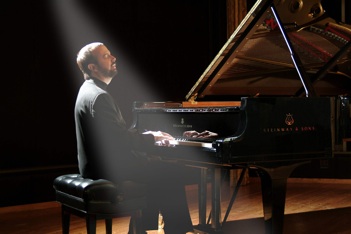
I’m profoundly grateful for the technology that has made my life possible. It may take the romance out of the creative process for some observers who like to think that creating music is a matter of the heavens opening and the choirs starting to sing. The reality is that you start with an idea and work really hard to sculpt what should come next. It truly is 1% inspiration and 99% perspiration. Some people might be discouraged by that idea or that there’s so much high tech stuff around my music and my creative process, but rather than viewing that as a negative, I consider it a blessing. After all, think of all I wouldn’t be able to do without this technology.
We’re sending a petition to other music software companies asking them to make their products more accessible for blind users because there’s a lot of software out there that blind people can’t use because screen readers can’t read it. The purveyors need to understand that there is an audience for these adaptations and that these adaptations will also improve the quality of the product for sighted users.
KP: We’re obviously in the midst of a difficult time here in the US, yet your new music is as sunny and blissful as ever. Is this style of music an escape or refuge for you or are you intentionally creating a musical refuge for others?
Kern: I would say that the music on my records is more an escape and refuge for others than for myself. Over the years, I have been asked if I wanted to create music with more powerful emotions than what you've heard so far. The answer is a definite YES.
KP: How much of “Endless Blue Sky” did you improvise?
Kern: None. There is not an improvised note on the entire record.
KP: Was that your choice?
Kern: Yes. I may return to the "soundpainting” process that yielded pieces like "After the Rain" and "A Million Stars" in the future, but I feel that I need a break from doing that right now.
Today, I feel that tunes like "Velvet Green and "Scene in a Dream" are more representative of where my writing is than the soundpaintings of my earlier records. With "Velvet Green," I just love that classical chamber thing and hope to come back to it more in future CDs. I think that “Scene In a Dream” and “Always Near” would be great closing credit roll pieces for romantic British, Merchant Ivory-type films. “Scene in a Dream” was a melody that I had lying around for years, and I couldn’t quite make it work. When I came back to this album, I was determined. It took some doing, but I’m very pleased with how that song came out. It has a sort-of Ravelian character. I think that movie style of writing is more my focus than the soundpainting approach is these days.
KP: I think you’re about the only longtime artist still on the Real Music label. How has Real Music changed over the years?
Kern: I don’t think it has. Real has a specific idea of what their place is in the world and their vision has been consistent.
KP: How has becoming a Steinway Artist affected your career?
Kern: It assures me of having amazing pianos to play wherever I go, which I absolutely love. In the Far East, you encounter a preponderance of Hamburg Steinways because, essentially, New York serves North America and the rest of the world is served by Hamburg. There has been a significant difference in the instruments, but within the past two years, Steinway has integrated the Hamburg and New York instruments so that the pianos that are now being built are constructed more consistently. The new New York instruments are just breathtaking. “Endless Blue Sky” was recorded on a two-year-old New York B that was hand-chosen by the guru/Steinway tech of the Twin Cities area for Wild Sound Recording, where we did this album. This piano is just awesome, and the owner/chief engineer, Matthew Zimmerman, is a genius. He specializes in recording acoustic music and musicians, focusing heavily on classical. He also helped me find players for the record. We very actively discussed how the record should sound, and I’m just delighted with the results. I think the string sound is better than what we’ve done on any other record, and we have a recipe for that now.
KP: Were most of the other parts added in layers or in real time like you did on “The Winding Path”?
Kern: “Velvet Green” and “The Glistening Pond” were done live and without edits. For the other pieces, I put down my piano parts to the string parts, and then the violinist, cellist, and guitarist added their parts.
KP: What I really hate about older synth strings is the sound of attack. Real strings don’t do that, and I find it really annoying.
Kern: I think that the tone color we got on the strings we used for this record is a lot darker and a lot lusher than previous recordings. We also reinforced the outer lines with live players. We had a live violinist on the top end and a live cellist on the bottom end of the string parts, which gives a much less “canned” sound. The string sounds that we used were much better, plus we had better engineering and production.
KP: The solo piano piece, “Sunset Prayer,” felt different. Why?
Kern: That is my reinterpretation of a Gregorian Chant entitled “Victimae Paschali Laudes," much like “Keepers Of the Flame” from “Imagination’s Light,” is based on "Pange Lingua." "Victimae" is played on Easter in the Latin high mass. The sense of meter in the Gregorian Chant days was not what it is now. It’s a lot more fluid, and there really isn’t a time signature. With the thought of one day trying to notate this piece for sheet music, I tried to figure out if I could play it in a particular time signature, and what I settled on was a slow 3 - a VERY slow 3!
KP: That’s one of my favorite tracks. On most of your other albums, Terence {Yallop, president of Real Music} gave a suggestion like, “Play the sky” and that sort of thing, but that didn’t happen with this record at all?
Kern: No. Everything was agreed upon beforehand.
KP: Earlier you said that you wanted to create music with more powerful emotions than you’ve shown us until now.
Kern: I want my audience to know that there’s more to me and my music than what has been recorded so far. I’ve always felt that successful artists - The Beatles, for example - never do the same thing twice. They always do something new. I understand the need to have a trademark sound, but could something be added to it? There is a lot of music that I would love to put before the public, and I hope to have the opportunity to do that someday. Many forces come together to create an album. It is never the undiluted creative vision of any one person, and there are all sorts of compromises in records, film, television, and any artistic endeavor when people with divergent interests come together.
KP: That’s undoubtedly why so many artists are staying completely independent at this point.
Kern: I think the internet is going to be to the music industry what the Industrial Revolution was to the creation of the middle class. In the days of Mozart and Beethoven, the aristocracy owned all of the land and the peasants were sharecroppers and such. Along comes the Industrial Revolution, and the peasants now own their own homes, resulting in all kinds of changes. Later, the record industry is created and there are companies who have trucks, warehouses, and distribution, so they become the gatekeepers and decide what kinds of music get recorded, what gets played on the radio, what sells, etc. Now, you have this tremendous democratization where everybody is potentially their own record company and everyone has an equal opportunity to get their product before an audience. That makes the competition even more intense because there is SO much product out there. With no gatekeeper or filtering system, everyone has a shot. Then it becomes “how good are you at marketing and getting your music out there?”
I’m really interested in hearing what people think of this new record because I’m searching for direction from my audience. I’m hoping they will not only tell me what they like about what I’ve done so far, but what they would like me to do in the future.
KP: I’m wondering if people who haven’t seen you play live would even know where to start with that.
Kern: Well, since you have seen me perform live, you might be able to fill that void somewhat. When your readers decide what their answers are, they should visit me on MySpace and Facebook. There are a lot of pages for me on Facebook that other people have created, but there’s only one official page and it’s the only one that has my tunes on it. You can get to it from my website, kevinkern.com. I’m very interested in hearing what people think. After all, it’s all about the audience in the end.
KP: I was watching your videos on YouTube last night and really loved the one where you jazzed up “Through the Arbor.” I don’t think many people realize what an amazing jazz pianist you are.
Kern: I perform that version of “Through the Arbor” and recount this story in concert: Prior to my performance at the Taiwan Educational Cultural Foundation for the Blind, which is where that video was shot, a girl sat down and tried to play “Through the Arbor” from memory after listening to the record. She made an interesting mistake that kind of jogged my head, so I sat down and played it with the Peanuts reference that’s in the video. When I put that in the show, it always gets a good laugh. That happened in 2003 when there was no sheet music available. A couple of years later, I went back and presented the president of the TCFB, who is a good friend, with a Braille edition of the “In The Enchanted Garden” songbook.
KP: Interesting! I also really enjoyed the video from the Taiwan television show where the host kept saying you were talking too much. I guess they couldn’t get the subtitles up fast enough or something.
Kern: That was a very interesting experience because the show is taped and was run two days later, while I was still in town. The day after it aired, Pam and I were walking through this massive outdoor jade market, and people were looking at us and going, “Is that....” “Is he really...” and pantomiming air piano! Being on that show was equivalent to being on Leno here. The whole island saw it.
KP: How many times have you been on TV in Asia?
Kern: Several times, not including our trips to The Cultural Foundation For the Blind. There would be a phalanx of still and video cameramen following us, not unlike for a head of state, and we would be on every local newscast that day. Aside from that, I’ve been on morning talk shows in every market that I’ve ever visited.
KP: Wow, how many times have you been on TV here?
Kern: This genre of music has a whole different place in the Far East than it has in the United States. I’ve been on QVC and I’ve been interviewed in other major markets but my music has been on TV here more often than I have personally.
KP: Are you recognized very often in Minnesota?
Kern: Not too often, which I’m fine with. It makes life immeasurably easier. I’m recognized occasionally when I go to things like the NAMM show, but that’s an industrial trade show where you’re likely to encounter people who know you because they do what you do or have something to do with the music business. One of the other reasons I’m not often recognized is that my picture is not on my records, so even people who know my music well might not know what I look like.
KP: Your picture is on “Imagination’s Light.”
Kern: That’s the only one.
KP: Are you still a baseball fanatic?
Kern: Hardcore! Since our last interview, The Red Sox have won - in ’04 and ’07. Now I’m ready to see The Cubs win it all because I think that would be great for the game. They haven’t won The World Series since before radio was invented, in 1908! There is a joke that the greatest thing that could ever happen would be the Red Sox vs the Cubs in the bottom of the ninth with the bases loaded, two outs, the score is tied, 3 and 2, and then the world ends!
KP: Didn’t you have a goal at one point to see a game in every stadium?
Kern: Yeah, and we’ve been falling down on the job there, but we’ll probably get back to it. I did get a chance to see a baseball game at the Tokyo Dome when we were on tour in ’06. Man, it is surreal! Playing baseball is a whole different thing in Japan.
KP: How is it different?
Kern: Well, if you close your eyes, it feels more like a college football game than major league baseball because each team has a brass band and they each have a fight song, and your band plays when your team is at bat. Of course the food is completely different, too. Sushi at the ball park - yeah! The park is spotlessly clean, too - no peanut shells on the ground! It was an awesome game because the home team won in what Americans call a walk-off home run. If the team batting in the bottom of the ninth hits a home run that pulls them ahead in the score, the game ends at that point. It doesn’t matter how many outs there are because once it’s the bottom of the ninth and you’re ahead, the game’s done. In Japan, they call that a Sayonara game because the winning team goes, “Sayonara!”
For more information on Kevin, visit
his website and also his
Artist Page on MainlyPiano.com.
Photos by Kurty Photography
Kathy Parsons
February 2009

